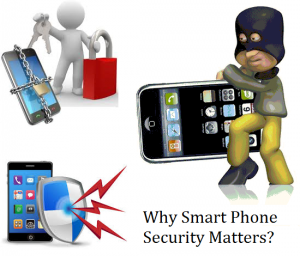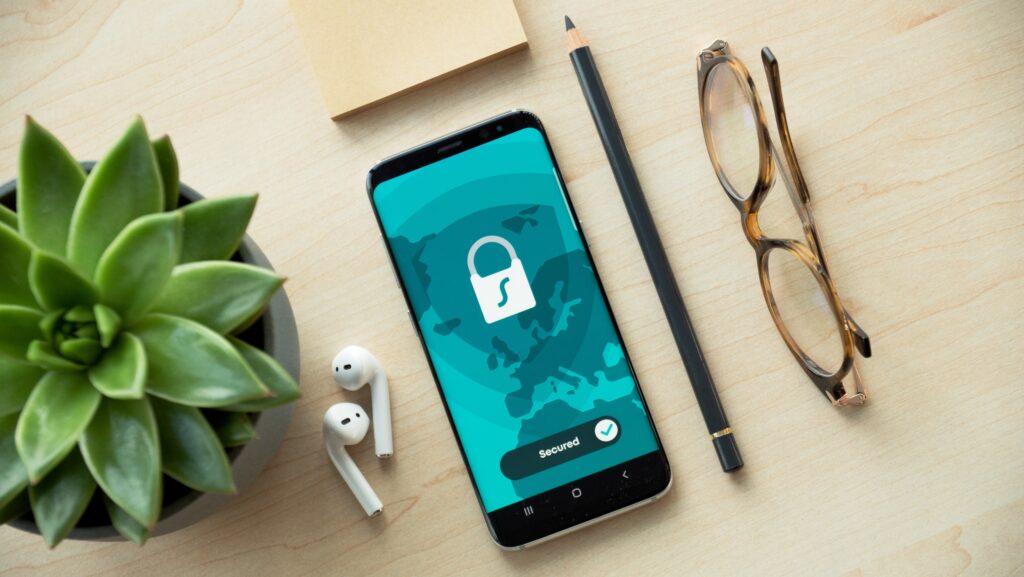
Smart Phone Security has become really a big concern for smart phone users. A long, long time ago, when phone were just phones – they made calls and received calls – surely they fulfilled their purpose. Today, however, phones are no longer just phones; they evolved – simply through consumer preferences – they morphed into this doohickey – sort of like a personal handheld computer that is capable of making receiving calls. Consequently, when phones were simply phones, security was not an issue. Today, smart phones have taken over – rendering the traditional cell phone nearly extinct. However, smart phones are far from perfect, as Smartphone security is its biggestconcern plaguing users.
However, while most users are happy to overlook the critical issue of smart phone security – doing so can lead to catastrophic outcomes. Therefore, Smartphone security matters – more so than you may think. Think about it, you probably have gigabytes of personal data that you don’t even know it’s there. Now imagine if that data falls in the hands of a bad guy? Criminals know the fact that by stealing your mobile phone, they not only can sell the hardware, but can also sell your personal data on the black market. This is the reason why criminals are always gearing up efforts to somehow hack into – or better yet – steal your smart mobile phone. Therefore, it’s imperative that you remember and implement the following set of guidelines if you don’t want to compromise your privacy, or worse yet, your identity.

Smartphone Security
Avoid losing your Smart Phone:
This pointer is surely a no-brainer – but we can’t stress this enough. Time and time again – it happens – you put your phone down at the bar – and next thing you know – you forget all about it. Once your phone is lost, chances are 2 in 3 that whoever finds your phone, will surely attempt to access and indubitably try to utilize your data for illegal activities. Though, the probabilities are slightly in your favor, a reasonable minded person would take no chances. There are several things you can do to avoid losing your phone. For once, avoid taking out your phone from your pockets. For when you need to make a call or when someone is calling you, take out your phone – after your conversation ends – simply put it back in your pocket or purse – instead of just placing it on the table somewhere. It may be a take a little getting used to, but once you make a habit of it – you can be confident that your phone won’t go anywhere.
First measure of Defense:
If you don’t already have a lock pattern or PIN on your smart phone, you need to set one up ASAP. A security pin or an unlock pattern is your first line of defense against someone attempting to get access to your data. Try to setup a pin or an unlock pattern that easy for you to remember and conceivably impossible for others to guess. Try to avoid setting your birthday or any other obvious pin numbers that can be guessed. To set a strong, effective password, you could also use a combination of letter, numbers and symbols, but make sure to set those with which you are familiar with. Another, important thing to remember about setting effective passwords is that you should never use the same password for different logins – this is a very common mistake – and this how most victims lose access to their bank accounts, their credit cards, their email address and other critical online login access rights – simply by keeping the same passwords for all websites.
An optional measure:
If you are the panicky, obsessive type – who constantly fears about either losing or leaking data, then your best option is to not store any personal data on your mobile device. Limit your personal data only to your desktop computer.
Second measure of defense For Smartphone security:
If you could invest in two Smartphone security applications, then you need to invest in good remote wipe software along with a data security app. Both software complement each other, yet are often sold separately. The remote wipe software enables you to remotely delete all data just in case you end up losing your phone, while the data security app lets you protect your private data from being accessed or seen. Most of these applications are available for android and iPhone, and can be found in their respective online stores.
Importance Of Smartphone Security
Smartphone security is important because it helps protect your personal data from being accessed by malicious actors. Smartphones are increasingly becoming targets for cybercriminals, who can use a variety of methods to gain access to your personal information, such as phishing, malware, and other malicious attacks. By taking steps to secure your device, you can protect yourself from these threats and keep your data safe.
Need Of Mobile Security
Security is an important factor in any system. It is important to ensure that the system is secure from unauthorized access, malicious attacks, and data loss. Security measures should include strong passwords, encryption, firewalls, and other security protocols.
Things Happens When Mobile Devices Are Not Secure
When mobile devices are not secure, they are vulnerable to a variety of attacks. These attacks can range from malicious software such as viruses, Trojans, and spyware, to phishing and identity theft. Without proper security measures in place, hackers can access sensitive data on the device, such as passwords, credit card numbers, and other personal information. This can lead to financial loss, identity theft, and other serious consequences.
Issues Of Mobile Security
The issues of mobile security include data theft, malware, phishing, and identity theft. Data theft is when hackers gain access to sensitive information stored on a mobile device, such as passwords and credit card numbers. Malware is malicious software that can be used to gain access to a device and take control of it. Phishing is when a hacker attempts to trick a user into providing sensitive information, such as passwords or credit card numbers.
Use Phone Without Security Updates
It is not recommended to use a phone without security updates. Security updates are important for protecting your device from the latest threats and vulnerabilities, which can be used to gain access to your data and personal information.
Things Happens If Don’t Update Phone
If you don’t update your phone, your device will be vulnerable to data theft, malware, and other security threats. Hackers and other malicious actors can exploit the vulnerabilities in your device to gain access to your data and personal information. Without security updates, your device is at risk of becoming infected with malicious software, which can be used to steal your data or gain access to accounts and other sensitive information. Additionally, your device may become slower or less efficient due to outdated software or hardware. Eagle Eyes Tourism
Apple Vs Google Better For Privacy
It depends on what you are looking for in terms of privacy. Apple has a strong track record of protecting user data and privacy, while Google has been criticized for its data collection practices. Apple has implemented strong security measures such as two-factor authentication, encryption, and end-to-end encryption. Google, on the other hand, has been criticized for its data collection practices, such as the use of its own advertising network.
Easier To Hack Iphone Or Android
It depends on the device and the security measures in place. Generally speaking, iPhones are more secure than Android devices due to Apple’s tighter control over the operating system, as well as their use of encryption and other security measures. That being said, both devices can be vulnerable to hacking, so it is important to take the necessary steps to protect your device.
Completely Secure OS
There is no completely secure operating system, as all systems have some vulnerabilities. However, some operating systems are more secure than others. For example, Apple’s iOS is considered to be one of the most secure operating systems, due to its tight control over the system, its use of encryption, and its regular security updates.
Smartphones A Threat To Privacy
Yes, smartphones can be a threat to privacy. Smartphones store a lot of personal information, such as contacts, emails, photos, and browsing history, which can be accessed by hackers. Additionally, many apps on smartphones can access a user’s location and other data, which can be used to track a user’s activities. To protect your privacy, it is important to use a secure lock screen, only download apps from trusted sources, and be aware of what data is being collected by apps.
Cell Phone With Best Security
The answer to this question depends on what type of security features you are looking for. Generally, iPhones and Android phones are considered to have the best security features, as they are both equipped with encryption and other security measures. Additionally, many phones now come with biometric authentication, such as fingerprint scanners or facial recognition, which can help to keep your data secure.
Greatest Threat To The Security Of Mobile Devices
The greatest threat to the security of mobile devices is malware. Malware is malicious software that is designed to steal data, damage systems, and gain unauthorized access to networks. Malware can be spread through malicious websites, email attachments, and apps. It is important to keep your device up-to-date with the latest security patches and to only download apps from trusted sources. Additionally, using a secure and encrypted connection when connecting to the internet can help protect your device from malicious attacks.
Better Security Apple vs Android
Apple has invested heavily in security technologies, such as its secure boot process, sandboxing, and encryption. Apple also has a more stringent App Store review process, which helps to prevent malicious apps from being approved. Additionally, Apple’s operating system is closed-source, meaning that only Apple can access the source code and make changes. This makes it more difficult for hackers to identify and exploit security vulnerabilities.
Most Important Thing In Security
The most important thing in security is having a comprehensive security strategy. This should include measures such as strong authentication, encryption, access control, and monitoring. Additionally, organizations should have a plan in place to respond quickly and effectively to any security incidents.
Phones Get Hacked The Most
The phones that get hacked the most are those running the Android operating system, due to its popularity and the availability of malicious apps. iPhones are also vulnerable to hacking, though not as often as Android phones.
Importance Of Android Security
Android security is important because it helps protect users from malicious apps, malware, and other cyber threats. It also helps protect personal data, such as passwords and credit card information, from being stolen or misused. Additionally, Android security helps ensure that apps and services are running safely and securely on the device.
Powered by NewSoftwares.net
